Are you constantly struggling with rust stains on your countertop? Rust can be a stubborn and unsightly problem, but fortunately, there are several ways to remove it from your countertop surface effectively.
Removing rust from countertops can be a frustrating yet necessary to maintain the cleanliness and appearance of your kitchen or workspace. Rust stains often form due to prolonged contact with water, metal objects, or other sources of moisture, and they can be particularly stubborn to eliminate. Fortunately, there are effective and accessible methods to tackle rust stains without damaging the countertop surface.
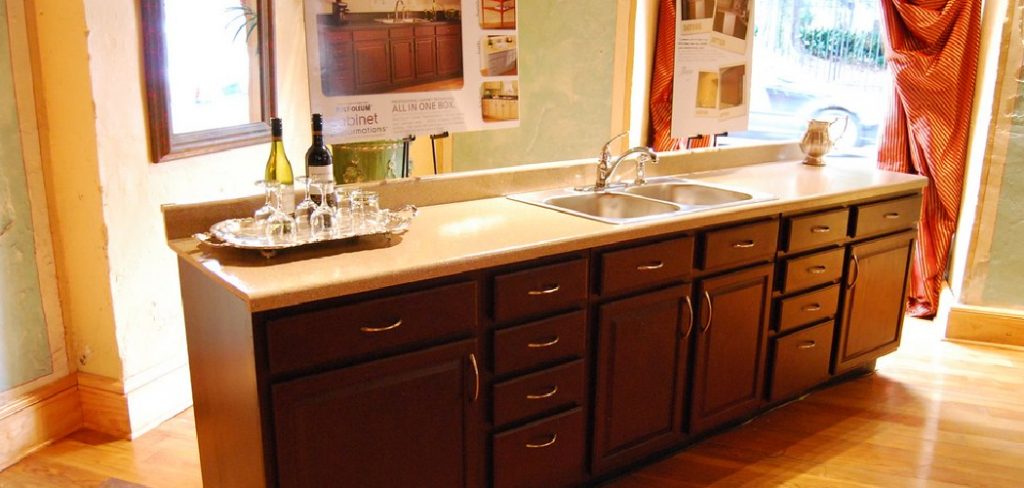
This guide on how to get rust out of countertop will walk you through safe and easy techniques to restore your countertop to its original condition. Let’s get started!
What Are the Causes of Rust on Countertops?
Before diving into the methods of removing rust from countertops, it’s essential to understand what causes rust in the first place. Rust is a natural process that occurs when iron or metal comes into contact with oxygen and moisture. When this happens, a chemical reaction called oxidation takes place, resulting in the formation of rust.
This process can happen on any surface made of iron or steel, including your countertop if it has a metal component such as a sink or faucet.
Some common causes of rust stains on countertops include:
- Contact with water from leaking faucets or spilled drinks
- Placing wet metal objects directly onto the countertop surface
- Improperly coated or unsealed countertops that are susceptible to moisture absorption
- Regular use of harsh cleaning products that contain corrosive chemicals
Understanding the causes of rust on your countertop can help you prevent future stains and take necessary precautions to avoid damaging your surface.
What Will You Need?
Before getting started on removing rust from your countertop, it’s essential to gather all the necessary materials and tools. Here are some items you may need:
- White Vinegar or Lemon Juice
- Baking Soda
- Hydrogen Peroxide
- Soft Cloth or Sponge
- Toothbrush
- Scraper (plastic or wooden)
- Steel Wool (fine grade)
Once you have everything ready, it’s time to start removing that stubborn rust!
8 Easy Steps on How to Get Rust Out of Countertop
Step 1. Clean the Surface
Start by clearing the countertop of any objects or debris. Use a damp soft cloth or sponge to wipe the surface and remove any dirt, dust, or loose particles. This ensures that the rust-removal process will be more effective, as the surface will be clean and free from obstructions.
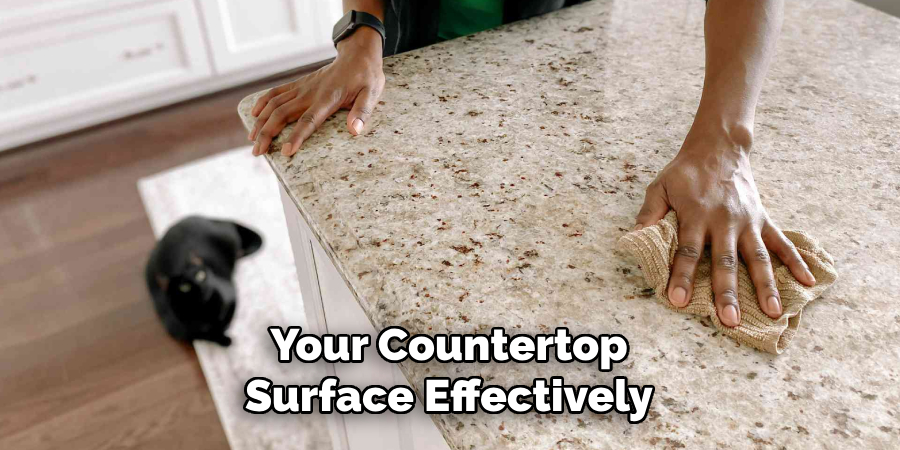
Pay extra attention to the areas surrounding the rust spot to ensure no contaminants interfere with the cleaning process. If there are any sticky residues or grease, use a mild dish soap solution to clean the area gently, then dry it thoroughly before moving on to the next step.
Step 2. Apply a Rust-Removing Solution
Choose your preferred rust-removing agent such as white vinegar, lemon juice, or a baking soda paste. For vinegar or lemon juice, soak a small amount onto a soft cloth or sponge and gently dab it onto the rusted area. Mix baking soda with a small amount of water to form a thick paste and apply it directly to the rust.
Allow the solution to sit on the rusted spot for 10-15 minutes to break down the rust effectively. Avoid scrubbing at this stage to prevent spreading the rust or damaging the countertop surface.
Step 3. Scrub and Rinse the Area
After allowing the rust-removing solution to sit, use a soft-bristled brush, sponge, or non-abrasive scrub pad to scrub the rusted area gently.
Avoid using excessive pressure to prevent scratching the countertop surface. Work in small, circular motions to lift the rust effectively. Once the rust has been removed, rinse the area thoroughly with clean water to remove any residue from the cleaning solution. Be sure to dry the surface thoroughly with a soft towel to prevent further moisture buildup.
Step 4. Prevent Future Rust Formation
To keep your countertop rust-free in the future, take proactive steps to minimize moisture and exposure to rust-causing elements. Use coasters or trivets under metal objects to prevent direct contact with the surface.
Regularly wipe down the countertop to remove water or spills, and consider applying a protective sealant if appropriate for your countertop material. Additionally, store cleaning products or tools containing metal away from the countertop to avoid potential rust stains.
Step 5. Maintain Regular Cleaning Habits
Consistency is key to preserving the condition of your countertop and preventing rust or other damages. Make it a habit to clean the surface daily using a mild soap and water solution, followed by drying it thoroughly with a soft cloth.
Avoid harsh cleaning agents or abrasive tools that could damage the finish. Periodic inspections for signs of rust or wear will also help you address minor issues before they become significant problems, keeping your countertop looking its best for years to come.
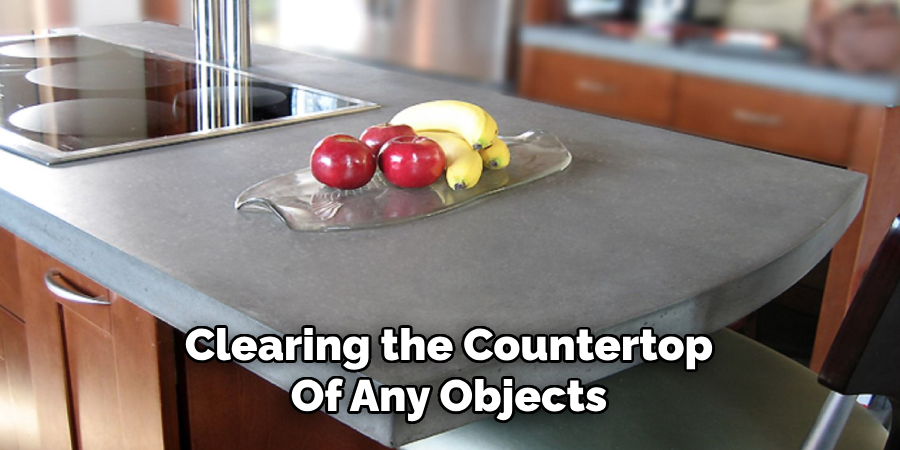
Step 6. Address Rust Immediately
If you notice any signs of rust on your countertop despite preventive measures, act swiftly to remove it before it worsens. Use a non-abrasive cleaner or a mixture of baking soda and water to gently scrub the affected area with a soft cloth or sponge.
Avoid harsh chemical rust removers as they may damage the countertop surface. After cleaning, rinse thoroughly with water and dry the area completely to prevent moisture from causing further issues. Regular vigilance and prompt action can help maintain the longevity and appearance of your countertop.
Step 7. Apply a Protective Sealant
To extend the lifespan of your countertop and maintain its appearance, consider applying a protective sealant. A quality sealant can create a barrier against stains, scratches, and moisture, ensuring your countertop stays in excellent condition. Follow the manufacturer’s instructions for application, and ensure the surface is clean and dry before beginning.
Reapply the sealant as recommended, typically every six to twelve months, to ensure continued protection. This added layer of care can make a noticeable difference in preserving the beauty and functionality of your countertop.
Step 8. Perform Regular Maintenance
Routine maintenance is essential for keeping your countertop in pristine condition. Wipe the surface daily with a soft cloth and a mild cleaning solution to remove dust, spills, and stains.
Avoid using abrasive sponges or harsh chemicals that could damage the surface. Additionally, inspect your countertop periodically for any signs of wear, such as chips, cracks, or discoloration, and address these issues promptly to prevent further damage. Regular care and attention will help your countertop remain both functional and visually appealing for years to come.
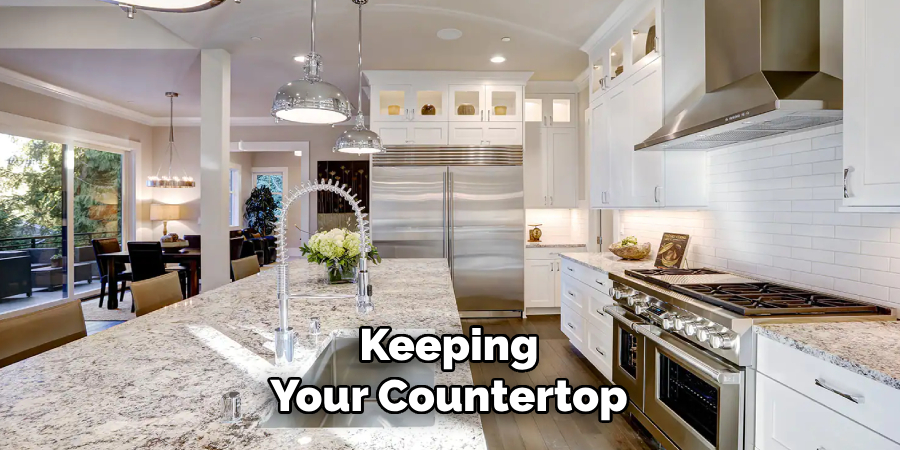
By following these 8 simple steps, you can effectively remove rust from your countertop and prevent it from reoccurring in the future.
5 Things You Should Avoid
- Using Abrasive Scrubbers: Avoid using steel wool or abrasive scrubbers, as they can scratch the countertop’s surface and cause permanent damage.
- Applying Harsh Chemicals: Steer clear of strong acids or harsh chemicals like bleach, as they might discolor or weaken certain countertop materials.
- Ignoring the Rust Stain for Too Long: Leaving rust stains untreated can allow them to set deeper into the countertop, making removal more complex and potentially causing long-term damage.
- Using Excessive Water: Excess water may seep into the countertop material, especially if it is porous, leading to further stains or warping.
- Using Incorrect Cleaning Techniques for Your Countertop Type: Each countertop material is unique; using the wrong cleaning method—for example, vinegar on marble—could harm the finish or structure. Always verify the best approach for your specific type of countertop.
What Type of Oil is Best for Countertops
When it comes to choosing an oil for your countertops, there are a few options to consider. However, not all oils are suitable for all countertop materials. It’s essential to understand the different types of oils and their benefits to make the best choice for your specific needs.
- Mineral Oil: Mineral oil is popular for sealing and protecting wooden countertops. It is colorless, odorless, and food-safe, making it ideal for use in the kitchen. Mineral oil penetrates deep into the wood fibers, providing long-lasting protection against moisture and stains.
- Walnut Oil: Walnut oil is another excellent option for wooden countertops. It is a natural, food-safe oil that can help enhance the color and grain of the wood. It also provides a protective layer against water and stains.
- Coconut Oil: Coconut oil has gained popularity recently for its various health benefits, but it can also be used as a natural sealant for wooden countertops. Its high saturated fat content makes it resistant to rancidity and mold growth.
- Beeswax: Beeswax is another natural option for sealing and protecting wooden countertops. When combined with mineral oil, it creates a durable finish that repels water and prevents staining.
- Tung Oil: Tung oil is popular for sealing stone countertops, such as granite or marble. It provides a glossy finish and helps enhance the stone’s natural colors and patterns. Tung oil is also heat-resistant, making it a great option for kitchen countertops.
Ultimately, the best type of oil for your countertop will depend on its material and your specific needs and preferences.
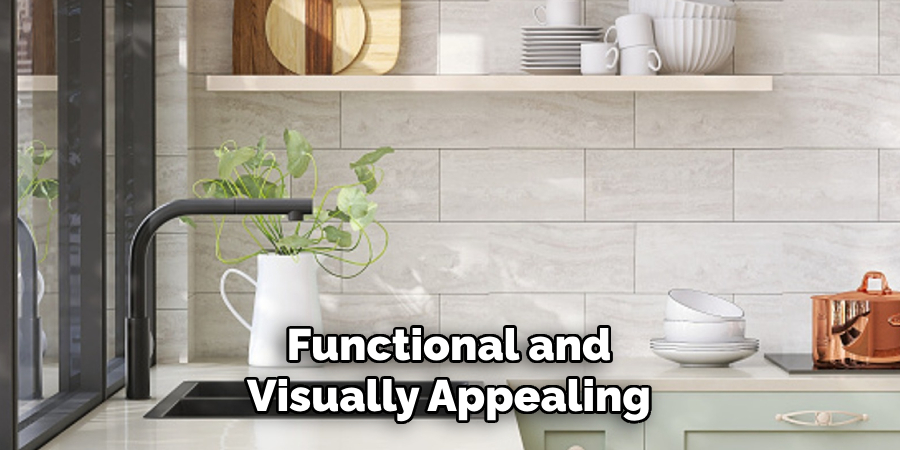
Conclusion
How to get rust out of countertop is a straightforward process when using the right techniques and materials.
Start by identifying the type of countertop surface, as different materials require specific methods to avoid damage. For most countertops, baking soda and water can be applied to form a paste that gently lifts rust stains without being abrasive. Alternatively, white vinegar can dissolve rust for its natural acidity.
Apply the solution to the affected area, allow it to sit, and then scrub gently with a soft cloth or sponge. Commercial rust removers might be necessary for stubborn stains, but always test in an inconspicuous area first.
Proper cleaning and regular maintenance can prevent future rust buildup, ensuring your countertop remains spotless and in excellent condition.
Professional Focus
Angela Ervin, a former interior designer turned blogger, specializes in kitchen design and renovations. Through her website, she blends her passion for cooking with design expertise, sharing practical and creative ideas. Known for balancing functionality and beauty, Angela’s insightful content has made her a trusted voice in home design and lifestyle.
About the Author
Angela Ervin, an experienced interior designer and blogger, combines her passion for kitchen renovations with storytelling. Living in Petersburg with her family, she enjoys cooking and testing her projects firsthand. Known for her humor and relatable style, Angela shares creative, functional design insights through her content, making her a trusted voice in home design.
Education History
University: Virginia Commonwealth University
Degree: Bachelor of Fine Arts (BFA) in Interior Design
- Angela’s education at VCU focused on mastering core interior design principles, including spatial planning, color theory, materials selection, and sustainable design practices.
- She gained hands-on experience through studio projects and collaborative design exercises, which honed her ability to create functional and aesthetically pleasing environments.
- Her coursework also emphasized problem-solving and practical applications of design, preparing her for real-world projects like her self-directed kitchen renovations.
- The program’s strong foundation in both technical skills and creative expression shaped Angela’s ability to seamlessly integrate form and function in her work.
